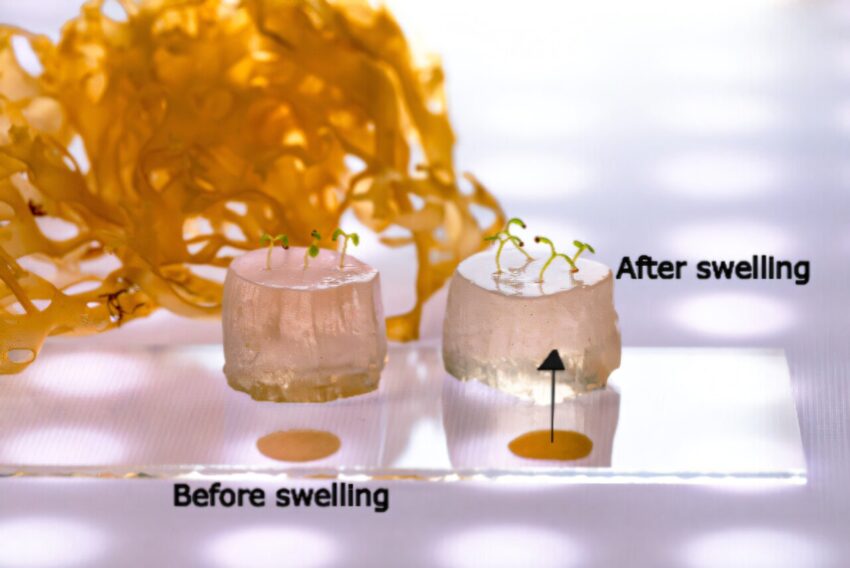A new eco-friendly material developed by Italian researchers could revolutionize agriculture by helping plants grow in extreme drought conditions while reducing the industry’s environmental footprint. This innovative invention—a fully biodegradable hydrogel made from red algae—can store massive amounts of water, provide nutrients, and support soilless farming systems such as hydroponics.
In the future, the hydrogel may even monitor plant health in real time, opening the door to a new era of sustainable and resilient agriculture.
### Collaborative Effort Between Leading Institutions
The project is a collaboration between the Free University of Bozen-Bolzano (UniBz) and the Istituto Italiano di Tecnologia (IIT) in Genoa. The findings were published in the journal *ACS Agricultural Science & Technology*.
Researchers from both institutions, including experts in engineering, smart materials, and agricultural sciences, worked together under the Competence Center for Plant Health to create the hydrogel and explore its potential applications.
### What Makes Hydrogels Ideal for Agriculture?
Hydrogels are known for their sponge-like ability to absorb and retain water. Their structure consists of polymer networks filled with pores, making them perfect for storing water or nutrients and releasing them slowly when needed.
While synthetic, petroleum-based hydrogels and foams have been used in horticulture, these are not biodegradable and contribute to environmental waste. The newly developed hydrogel offers a natural and sustainable alternative.
### Innovative Use of Red Algae
At IIT’s Smart Materials Unit in Genoa, the team created the hydrogel using carrageenan, a polysaccharide extracted from red algae. Carrageenan is commonly used in food production for its thickening and stabilizing properties, but in this project, it serves as the foundation for a water-retaining, biodegradable material that does not pollute the soil.
To enhance its performance, researchers enriched the hydrogel with algae extracts that act as biostimulants—helping plants absorb nutrients more efficiently, resist stress, and grow more vigorously.
### Promising Test Results
Tests conducted at UniBz in Bolzano revealed striking results. The hydrogel was able to swell by up to 7,000% through water absorption and then gradually released that water to sustain plant growth.
When tested using the model plant *Arabidopsis thaliana*, the hydrogel outperformed conventional hydroponic substrates, producing healthier and stronger plants with minimal water use.
### Towards Smart, Sustainable Farming
Looking ahead, the researchers plan to integrate flexible, biodegradable sensors directly into the hydrogel. These sensors would enable farmers to monitor plant health, soil conditions, and water levels in real time, facilitating more precise and efficient farming practices.
Such smart hydrogels could support the development of advanced agricultural systems that conserve resources while promoting resilient crop production.
### Expert Insights
“Our goal was to develop a material that is not only biodegradable and sustainable but also interacts directly with plants by providing them with water and nutrients efficiently,” said Dr. Camilla Febo, one of the lead researchers from UniBz and IIT. “By holding on to moisture and releasing it slowly, this hydrogel can drastically reduce water consumption while helping plants thrive in tough conditions.”
Professor Athanassia Athanassiou, Vice Scientific Director of IIT, emphasized the significance of natural-resource-based materials:
“At a time when freshwater is becoming scarce and plastics are polluting the planet, we need smart and sustainable materials. By using marine resources to engineer this hydrogel, we are offering a concrete solution for agriculture and beyond.”
### A Step Forward for Future Agriculture
With climate change, soil degradation, and growing water scarcity threatening food security, this innovation presents a valuable tool to help farmers adapt to a changing world.
By combining sustainability, biotechnology, and smart materials, the hydrogel project provides a promising glimpse into how future farming might balance productivity with environmental responsibility.
https://knowridge.com/2025/10/super-absorbent-biodegradable-hydrogel-could-revolutionize-farming-in-dry-climates/
